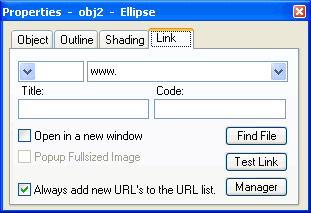
Use the Link Tab of the Quick Properties Editor dialog box to apply hyperlinks to objects.
An easy way to open the Link Tab of the Quick Properties Editor dialog box is to right-click an object, and then select Edit Link.
To avoid conflicts between hyperlinked text and hyperlinked text objects, always assign text hyperlinks using the Link Editor dialog box, available from the Insert>Insert Link (URL) menu option in the Text Editor dialog box. For more information, see Text Objects and Link Editor Dialog Box.

Apply hyperlinks to objects using the Link Tab of the Quick Properties Editor dialog box.
Controls on the Link Tab of the Quick Properties Editor dialog box include the following:
| Field/Control | Description |
| Link Type | Select from the drop-down menu the type of hyperlink you
want to apply to the selected object. Choose from among internal project
page ([page]), Internet (http://), email (mailto:), external file ([ file
]),FTP, or Telnet link types (protocols).
Or, you may leave the Link Type menu blank if the protocol is already in the URL text. This is useful when you want to use a protocol that is not in the Link type list (e.g., https://www.test.com or JavaScript:alert (’hey there’). You may also leave the Link Type menu blank if the URL is a partial URL (e.g., ../somefile.html).This is useful if you know that the file will exist in some location relative to the web page. For more information, see Hyperlinking. |
| URL | If you are hyperlinking to an Internet web page (http://),
email address (mailto:), FTP site (ftp://), or Telnet site (telnet:),
select from the drop-down menu a target or destination for the hyperlink.
The menu will display pre-defined hyperlinks that are being maintained
by your project’s Link Manager. If the desired hyperlink is not in the
drop-down menu, enter a new hyperlink target. (To automatically add it
to the drop-down menu for future use, click to checkmark the Add New URLs
to the URL List option box. For more information, see Hyperlinking.)
If you are hyperlinking to an page that is part of the project, select the link type “-page-“ then choose a page from the drop-down URL list. For more information, see Hyperlinking. If you are hyperlinking to an external file and know the location where the file will be after publishing, enter its path. It can be an absolute or relative path (e.g., http://www.somewhere/somefile.html or ../somefile.html) For more information, see Hyperlinking. |
| Do not enter a link type protocol (i.e., http://: or mailto:) in the URL field, unless you select the –blank—Link Type. | |
| Title | Enter a title or information, up to 65 characters, about the link to be displayed when the user hovers the mouse point over the hyperlink. |
|
Code |
If desired, enter code to provide additional functionality (i.e. “OnClick=[something]”) to the hyperlink. |
|
Open in a new window |
Click to checkmark to open the target page in a new browser window, if you have selected an internal project page or an Internet hyperlink (-page- or http://) from the Link Type drop-down menu. |
| Popup Fullsized image | Available only with an image object selected. Click to checkmark to set a hyperlink that opens a pop-up window containing a full-size rendering of the selected image when clicked. This is useful when you are linking a thumbnail image to its full-size image. |
| Always add new URLs to the URL list | Click to checkmark to automatically store in the Link Manager all of the hyperlinks you create. For more information, see Link Manager Dialog Box. |
| Test Link | Available only with an Internet hyperlink selected (http://). Click to test the hyperlink you are creating. If it is successful, the hyperlink target will open or launch. If it is unsuccessful, nothing will occur. |
| Find File | Click to display the Open dialog box, where you can browse
your system for an external file to be linked to the selected object.
After you have located the desired file and clicked the Open button, the
file path will appear in the Select or enter the URL to link to: field
and the Link Type dropdown list will display the [ file ] option. When
the page or project is previewed or published, clicking the linked object
will open the external file (and its associated plug-in program, if necessary
and if installed) in a new browser window or allow the user to either
run or save the file.
The external file will be gathered and published together with the web project if the “Gather all files” option is enabled on the Pages tab of the Publisher dialog box. (For more information, see Publisher Dialog Box.) |
| Manager | Click to open the Link Editor dialog box, to manage your stored hyperlinks and import or export additional links. For more information, see Link Manager Dialog Box. |
To open a context-sensitive help topic when using the Link Tab of the Quick Properties Editor dialog box, press F1.